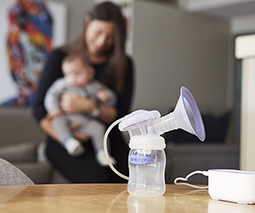D-MER: The chemical reaction to breastfeeding that could be making you feel sad

Have you ever experienced a sudden feeling of uncontrollable sadness or negativity while breastfeeding your baby only for it to pass shortly after? It might be a little known condition called Dysphoric Milk Ejection Reflex – also known as D-MER.
What is D-MER?
Dysphoric Milk Ejection Reflex (D-MER) is a condition which affects women during breastfeeding and is experienced as an abrupt feeling of dysphoria (sadness, anxiety, irritability or other unpleasant, negative emotions) that occurs just before the mother’s milk is released and lasts for only a few minutes.
It was first identified in 2007 by Alia Macrina Heise, an American lactation consultant who experienced the condition when breastfeeding her third child. Unsatisfied with answers from the professionals she sought out for advice, she started her own research which soon revealed there was something more to the sadness she was experiencing – and she wasn’t alone in her struggle. Alia is now a professional speaker and published author on the topic, with D-MER gaining attention globally from medical and breastfeeding communities.
Isn’t that just … ?
D-MER is different to other breastfeeding issues and shouldn’t be confused with other issues such as postnatal depression or postnatal psychosis, mood disorders, breastfeeding aversion, letdown nausea, nipple or breast pain, irritability or impatience with baby at the breast, separation sadness (if expressing), or a general dislike of breastfeeding. According to Alia’s website, D-MER.org, it’s a hormonal and physiological response to a mother’s milk release, and just like a reflex, is completely out of her control. There are also varied degrees of D-MER with the condition most commonly diagnosed by the mother herself as either mild, moderate or severe based on the frequency, intensity and how long it lasts.

What causes it
While research for D-MER still has a long way to go, preliminary investigations have revealed that the negative emotions felt by a mother during a milk letdown is due to an improper drop in the body’s natural chemical dopamine. In all lactating women, once milk is released the dopamine levels do need to lower in order to make room for more prolactin (which is what makes the milk), and most mums aren’t even aware that it’s happening. However, in mothers suffering from D-MER, the dopamine doesn’t drop properly which is what causes the sudden wave of sadness or negativity which lasts until the prolactin has risen and the dopamine levels have stabilised. It’s the same as your knee jerking in reflex to a hammer, once the stimulus has been removed (in this case the improper drop in dopamine), the reaction also stops.
Read more about breastfeeding issues:
- 7 ways to handle a breastfeeding bub who bites
- Teary mum’s raw selfie: “I cannot hide the struggle that is breastfeeding”
- 8 common breastfeeding struggles new mums need to know about
Signs and symptoms
Here are some of the signs and symptoms of D-MER:
- A feeling of dysphoria comes on suddenly before a letdown sensation or milk release
- You feel fine again after 30 seconds or up to 2 minutes (usually after the first letdown)
- You may feel dysphoria for all the letdowns in one feed (if intense D-MER)
- Dysphoria may or may not happen when expressing or experiencing a spontaneous letdown
- It can happen with spontaneous milk releases when you’re not even thinking about breastfeeding

Treatment options
Of course weaning is an obvious way to stop the effects of D-MER, however, for many mothers this is a less than ideal solution. In mild cases it will actually often self correct itself within three months, and at around nine months for moderate intensity, however, when D-MER is severe it can take a year or even longer to disappear.
According to D-MER.org, simple awareness and education can go a long way with helping women with their symptoms once they realise it’s a medical problem and not emotional. Any mums suffering from D-MER are also encouraged to track their condition in order to identify how intense it is, what things exacerbate it (like caffeine or stress) and what helps relieve symptoms (such as more sleep or exercise) so it can be managed better. In very severe cases medication might be prescribed to increase dopamine levels, however, awareness and lifestyle changes are the most preferred options.
Speaking up
While D-MER is still a newly recognised condition that requires more research and wider acknowledgement, the important thing to remember is not to ignore something that doesn’t feel right and to speak to your doctor. What you’re experiencing might not be D-MER, it could be something else entirely, but it is always best to seek a professional opinion sooner rather than later. Don’t suffer in silence.
If you feel you may be suffering from D-MER, or another issue such as postnatal depression, please speak to your doctor. For more details or consulting support for D-MER please visit D-MER.org.









